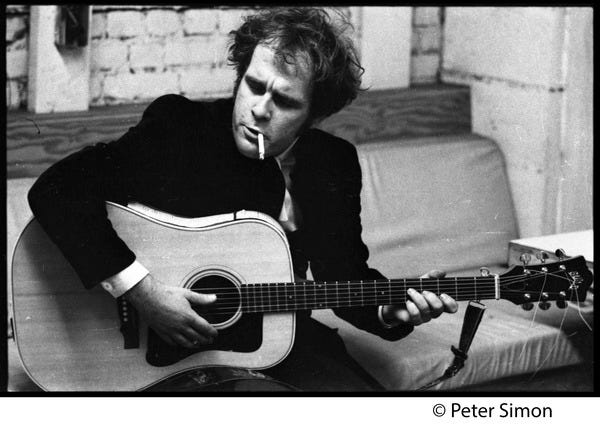Tim Hardin
Tim Hardin, an influential American folk musician known for his poignant songwriting and emotive vocal style, left a lasting impact on the folk and rock music scenes of the 1960s and early 1970s.
Despite his relatively brief career, marred by struggles with drug addiction, Hardin's work continues to resonate with audiences and musicians alike, earning him a revered place in music history.
Early Life and Beginnings
Born on December 23, 1941, in Eugene, Oregon, Timothy James Hardin showed an early interest in music, learning to play the piano and guitar during his childhood. His initial musical influences were rooted in jazz before evolving into a broader appreciation for folk music. After a stint in the Marines, which included time in Vietnam, Hardin moved to New York City in the early 1960s, immersing himself in the Greenwich Village folk scene, a hotbed for emerging talent.
Breakthrough and Success
Hardin's big break came with the release of his debut album, "Tim Hardin 1," in 1966, which included what would become two of his most enduring compositions: "Reason to Believe" and "Misty Roses." His follow-up album, "Tim Hardin 2," released the same year, featured "If I Were a Carpenter," a song that achieved widespread acclaim and was covered by various artists, securing Hardin's reputation as a gifted songwriter.
Hardin's music, characterized by its introspective lyrics and unique blend of folk, blues, and jazz influences, struck a chord with the counterculture movement of the time. His gentle, yet soulful voice conveyed a vulnerability that was both personal and universal, allowing his songs to resonate deeply with listeners.
Woodstock and Later Years
Tim Hardin's performance at the Woodstock Music and Art Fair in August 1969 marked a high point in his career, showcasing him before one of the largest audiences of his life. However, by this time, Hardin's struggles with heroin addiction were significantly impacting his career and personal life. Despite the acclaim he received at Woodstock, his performance there, like Bert Sommer's, did not feature in the subsequent documentary film, limiting its impact on his wider recognition.
In the years following Woodstock, Hardin released several more albums, including "Tim Hardin 3 Live in Concert" (1968), "Tim Hardin 4" (1969), and the later "Bird on a Wire" (1971). While these albums contained glimpses of Hardin's songwriting brilliance, his deteriorating health and addiction issues hindered his ability to sustain the momentum of his early career.
Legacy
Tim Hardin passed away on December 29, 1980, at the age of 39, from a heroin overdose. Despite his relatively short life and career, Hardin's influence on the folk and singer-songwriter genres is profound. His ability to express complex emotions through simple, yet deeply affecting lyrics and melodies has inspired countless musicians. Songs like "If I Were a Carpenter" and "Reason to Believe" have become standards, covered by artists across various genres, testifying to Hardin's enduring legacy as a songwriter.
In the years since his death, Hardin's work has been revisited by new generations of fans and musicians, drawn to the emotional depth and purity of his music. His contributions to the folk music canon, characterized by a blend of melancholy, beauty, and raw honesty, ensure that Tim Hardin remains an essential figure in the history of American music, remembered not just for his appearance at Woodstock, but for the timeless quality of his songs.
